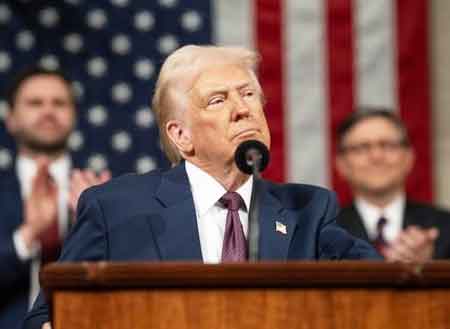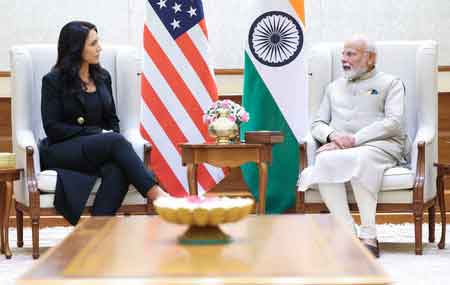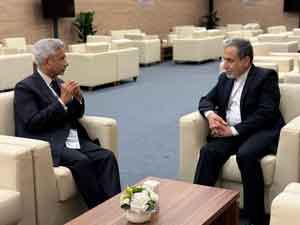The global economy is heading for the weakest period of growth since 1990 as higher interest rates set by the world's top central banks drive up borrowing costs for households and businesses, the head of the International Monetary Fund has warned, a media outlet reported.
Kristalina Georgieva, the IMF's managing director, said that a sharp slowdown in the world economy last year after the aftershocks of the Covid pandemic and the Russian invasion of Ukraine would continue in 2023, and risked persisting for the next five years, The Guardian reported.
In a curtainraiser speech before the fund's spring meetings in Washington DC next week, she said that the global growth would remain about 3 per cent over the next five years - its lowest medium-term growth forecast since 1990.
"This makes it even harder to reduce poverty, heal the economic scars of the Covid crisis and provide new and better opportunities for all," Georgieva said.
In a downbeat assessment as the world grapples with the worst inflation shock in decades, she said economic activity was slowing across advanced economies in particular. While there was some momentum from developing nations - including China and India - low-income countries were also suffering from higher borrowing costs and falling demand for their exports, the media outlet reported.
Ahead of the IMF publishing revised economic forecasts next week, Georgieva said global growth in 2022 had collapsed by almost half since the initial rebound from the Covid pandemic in 2021, sliding from 6.1 per cent to 3.4 per cent. With high inflation, rising borrowing costs and mounting geopolitical tensions, she said global growth was on track to drop below 3 per cent in 2023 and remain weak for years to come.
As many as 90 per cent of advanced economies would experience a decline in their growth rate this year, she warned, with activity in the US and the eurozone hit by higher interest rates, it added.
Comparing the challenge to "climbing one 'great hill' after another", Georgieva said there were still more problems to overcome: "First was Covid, then Russia's invasion of Ukraine, inflation and a cost of living crisis that hit everyone."
"So far, we have proven to be resilient climbers. But the path ahead - and especially the path back to robust growth - is rough and foggy, and the ropes that hold us together may be weaker now than they were just a few years ago," she was quoted as saying by the media outlet.

1.jpg)






Four held in Tripura for social media posts relating to Pahalgam terror attack
Police arrested four people including two retired teachers in the past 24 hours from Tripura’s three districts for making controversial posts on social media relating to the Pahalgam terror attack, officials said on Saturday.
Indian Army responds firmly to ceasefire violations by Pakistani troops along LoC
In the wake of the recent terrorist attack in Pahalgam, Pakistan has resorted to unprovoked ceasefire violations along the Line of Control (LoC). Over the past two days, Pakistani military posts have been targeting Indian positions with small-arms fire. The Indian Army has given a strong and appropriate response to these provocations, official sources said.
US religious freedom body finds conditions for Pakistan minorities 'worsening', urges strong action
Finding "a worsening religious and political climate of fear, intolerance, and violence" for minorities in Pakistan, the US Commission on International Religious Freedom (USCIRF) has asked President Donald Trump's administration to take strong measures against the Islamic Republic.
Residences of LeT commanders, Pahalgam attack suspects demolished across Kashmir
Security forces have intensified their crackdown on Lashkar-e-Taiba (LeT) operatives and suspects linked to the deadly Pahalgam terror attack that claimed 26 lives on April 22.
India, Pakistan will 'get it figured out,' says Trump on border tensions
US President Donald Trump refused to be drawn into India-Pakistan border tensions in the aftermath of the Pahalgam terrorist attack, stating that the two countries will "get it figured out one way or the other."
CM stresses scientific drain construction to combat flood
Chief Minister Prof. Dr. Manik Saha today emphasized the need to construct drains in a scientific manner to quickly drain the water accumulated in the city during heavy rains.
Bangladeshi man, drug smuggler held at Agartala Railway Station
In a significant development, two separate operations at Agartala Railway Station led to the arrest of a Bangladeshi national for illegal entry into India and a local individual involved in attempting to smuggle ganja to Assam.
Suspected Bangladeshi flag on Rickshaw, two detained
Tension flared in the Joynagar area of Agartala on Thursday late night after locals detained two individuals in connection with a rickshaw allegedly bearing the national flag of Bangladesh.